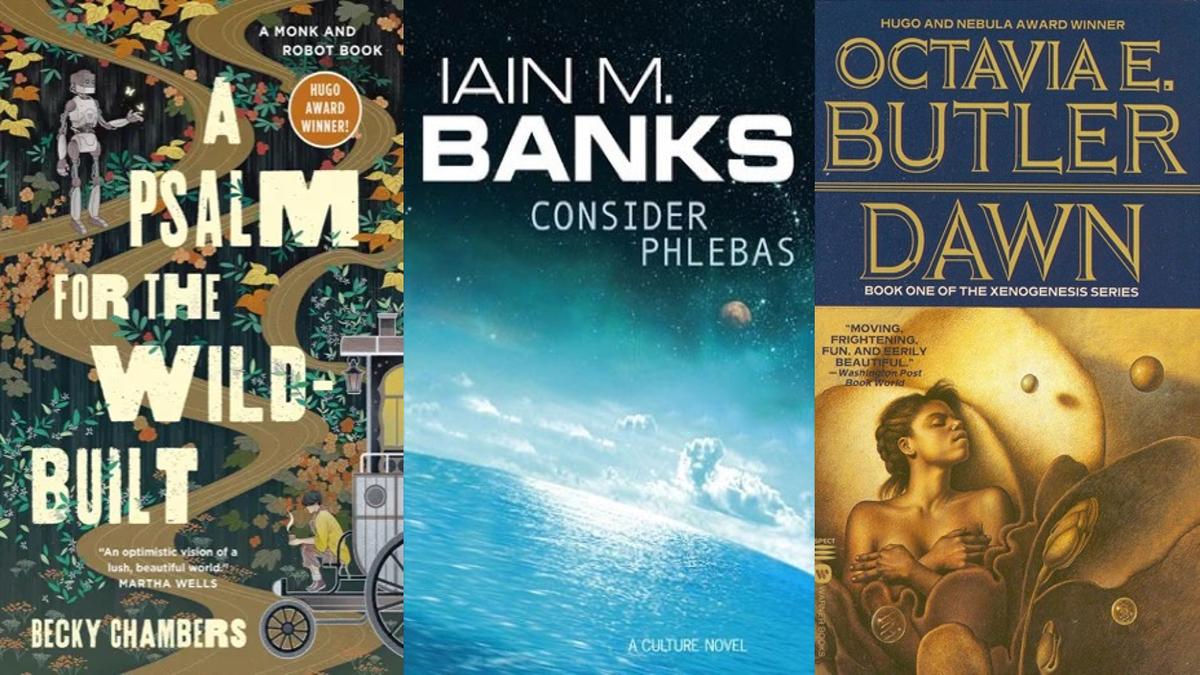Science fiction has long been a fertile ground for exploring themes of identity, societal norms, and the very definition of humanity. Considering that trans and gender-nonconforming people have existed throughout history, it’s only natural that science fiction narratives would reflect and explore these experiences. Here are some notable science fiction works that feature trans and non-binary characters and themes:
A Psalm For The Wild Built
Becky Chambers’ novel paints a hopeful future where technology and nature coexist harmoniously. Dex, a non-binary tea monk (essentially a therapist who serves tea), struggles to find fulfillment in their chosen profession. Seeking answers, Dex ventures into the wilderness and encounters Splendid Speckled Mosscap, a philosophical robot who is also genderless. Together, they embark on a journey of self-discovery and exploration, pondering life’s big questions. The story embraces optimism and open-mindedness, creating a comforting narrative about finding one’s place in the world.
The Left Hand of Darkness
Ursula K. Le Guin’s groundbreaking novel is a cornerstone of genderqueer science fiction. The story takes place on Gethen, a planet inhabited by ambisexual beings who can develop male or female characteristics during a monthly mating period called “kemmer.” Genly Ai, an envoy from an interstellar human federation, arrives on Gethen hoping to invite them to join the galactic community. The Gethenian society, where anyone can potentially become pregnant, challenges human concepts of gender and social constructs like war. This novel is a complex exploration of gender, politics, and survival, offering a thought-provoking commentary on human society.
I Sexually Identify As An Attack Helicopter
This short story by Isabel Fall takes its inspiration from an internet meme used to mock trans and non-binary identities. Set in a militarized future, soldiers are assigned genders based on their combat roles. Barb, the protagonist, is assigned “attack helicopter” as their gender to enhance their effectiveness as a pilot. During a bombing mission, Barb reflects on their past life as a woman, their current existence as a weapon, and the connection between combat and gender euphoria. The story is a blend of intellectual exploration of gender identity and a gripping military thriller.
Xenogenesis (Lilith’s Brood)
Octavia Butler’s Xenogenesis series delves into the complexities of gender and identity through an encounter with an alien species. Lilith, a human survivor of a nuclear holocaust, awakens on an Oankali spaceship. The Oankali are a three-gendered species who reproduce by combining their genes with other species, a process facilitated by non-binary Ooloi. The Oankali intend to repopulate Earth with human/alien hybrids. Despite their unusual methods, the Oankali are portrayed as adaptable, pragmatic, and emotional beings.
Ancillary Justice
Ann Leckie’s novel tells the story of the Radchaai Empire, an expansionist alien civilization that utilizes AI-controlled spaceship fleets and “ancillaries” (human bodies controlled by the AI) as ground troops. Breq, an AI who awakens in a single ancillary body after a spaceship crash, seeks to uncover the reasons behind the incident. While the Radchaai language uses “she” as a universal pronoun, Breq herself is non-binary and has a complicated relationship with gender. The novel explores themes of identity, colonialism, and the challenges of communication across different cultures.
The Culture Series
Ian M. Banks’ Culture series presents a utopian interstellar society where humanity and AI have merged, eliminating scarcity and violence. In the Culture, technology allows individuals to pursue their desires, including changing genders freely. Trans and non-binary identities are common, and transitioning between genders is as ordinary as any other life choice. In contrast, the series also explores planets where gender is a source of oppression, such as the Empire of Azad, a rigid three-gendered society. The Culture series offers a diverse and nuanced exploration of gender and its role in society.
The Murderbot Diaries
Martha Wells’ series centers on Murderbot, a genderless cyborg security unit that prefers watching media to engaging in violence. As a synthetic being trying to navigate an organic world, Murderbot’s struggle to fit in resonates with the trans experience. Murderbot experiences “biological dysphoria,” feeling discomfort with its human components and preferring the hard edges of its mechanical parts. The series delves into themes of alienation, identity, and the challenges of finding one’s place in a society that doesn’t always understand.
The Seep
Chana Porter’s novel portrays an alien invasion with a twist. Earth has been taken over by The Seep, a hyper-intelligent entity that has eliminated suffering, war, and capitalism. Humanity is free to pursue its desires using Seep technology. Deeba, the protagonist, abandons her trans wife, Trina, to relive her life as a baby. Heartbroken, Trina embarks on a rebellious quest to challenge The Seep and its utopian vision. The novel explores themes of loss, rebellion, and the complexities of utopia.
Light From Uncommon Stars
This novel tells the story of Shizuka Satomi, a violinist who has made a deal with the devil, promising to deliver seven violin prodigies in exchange for fame and fortune. Shizuka believes she has found her seventh soul in Katrina, a runaway trans violinist. Katrina, escaping an abusive home, finds refuge with Shizuka, unaware of the teacher’s dark intentions. The story also involves an alien refugee who runs a donut shop and falls in love with Shizuka. The novel blends elements of fantasy, science fiction, and romance, creating a story that is both sweet and poignant.
An Unkindness of Ghosts
Rivers Solomon’s novel reimagines the antebellum South in a science fiction setting. On the generation ship HSS Matilda, society is structured like the pre-Civil War South, with darker-skinned passengers forced to live in the lower decks. Aster, a Black, gender non-conforming healer, cares for the lower classes by cultivating medicinal plants. Targeted for abuse due to her identity, Aster, along with Theo, a non-binary surgeon, ignites a revolution against the ship’s overseers. The novel tackles themes of racism, oppression, and rebellion in a unique and compelling way.

